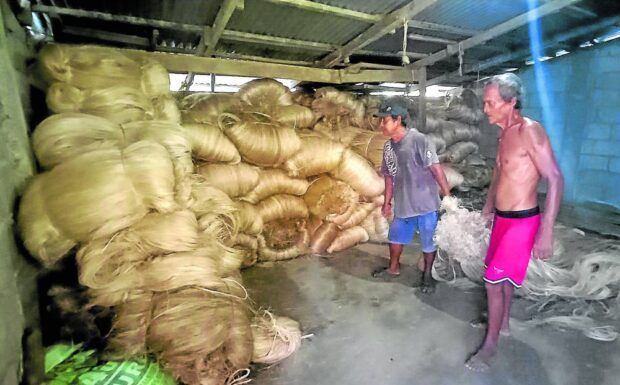
FEELING THE PINCH Abaca farmers in Virac town, Catanduanes continue to make a living out of selling abaca fiber despite low buying prices. MICHAEL B. JAUCIAN
LEGAZPI CITY — Some 13,000 abaca farmers from the island province of Catanduanes received food packs on Tuesday, Oct. 17, from the Department of Social Welfare and Development (DSWD).
The farmers deserve to get aid from the government because they are having a hard time earning money, Rep. Jose “Bong” Teves Jr. of Talino at Galing party-list said in a phone interview. Teves initiated and requested the assistance from DSWD.
For more than two months now, the abaca farmers’ livelihood is greatly affected due to significant drops on prices of abaca in the region, Teves said.
READ: Abaca industry in peril over use of polymer in peso bills
Before the pandemic in 2020, high grade abaca – S2 and grade I – were bought from farmers at P102 and P98 per kilo, respectively. Between 2021 and the start of 2023, the prices dropped to P98 and P93 per kilo. By July 2023, these high grade abaca were priced at P80 and P60 per kilo.
The low-grade abaca was worth P78 per kilo in 2019. Its price dropped to P70 by 2021 to 2023. It now sells for a meager P25 per kilo.
“The Philippine Fiber Industry Development Authority (PhilFida) has requested an additional P70 million for the upgrade of abaca in Bicol region and in other provinces, which I endorsed to Department of Budget and Management,” he told Inquirer.
He said the upgrade would be beneficial to farmers, who would get hybrid abaca for planting that would result to good production.
READ: Catanduanes abaca farmers defy the odds
Mary Anne Molina, PhilFida Bicol chief, said her office keeps convincing the farmers to produce high grade fiber for better income.
“I keep on reiterating to farmers that they should not focus on low quality fiber as the market, both local and international, demand for a good one and with that possibly earning money is easy,” Molina said in another phone interview.
She said in order to make the abaca farmers more productive, they continuously conduct trainings on making finished products (handicrafts) that are sellable.